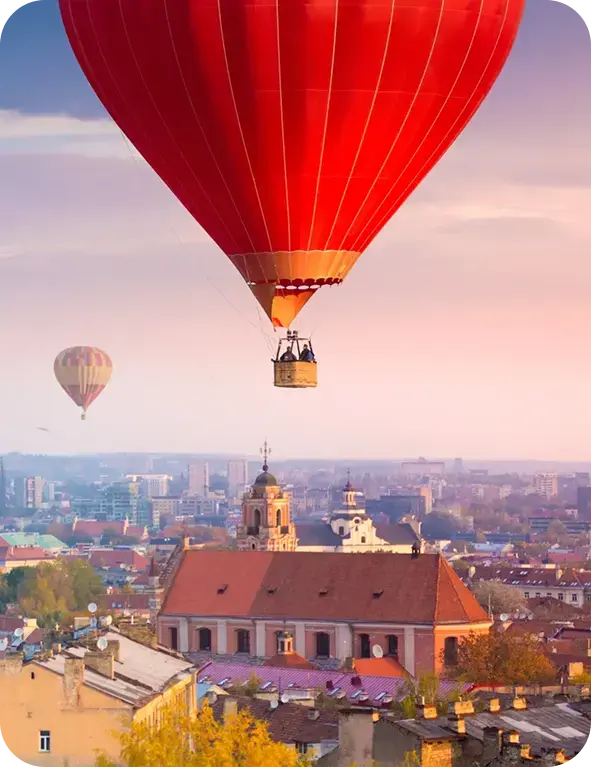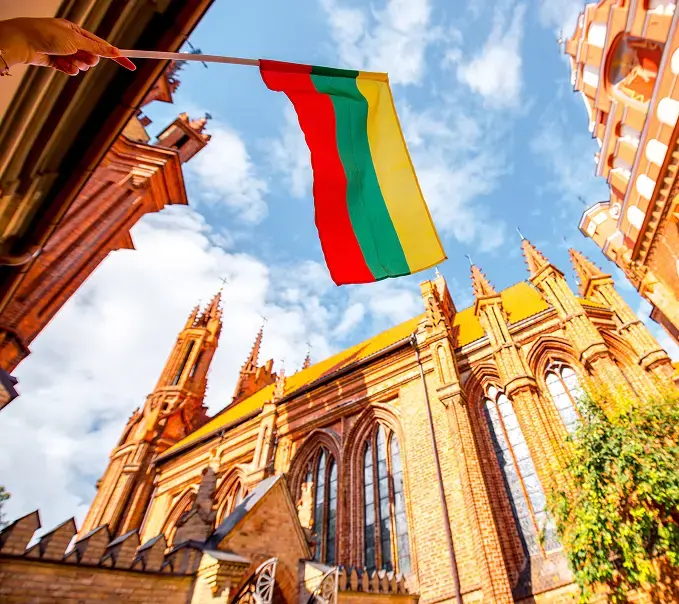Population
GDP (per capital)
Visa-Free Countries
GDP (purchasing power parity)
-
Navigating Immigration to Lithuania in 2025
-
Located in northeastern Europe, Lithuania is a vibrant and strategically positioned EU member, bridging Western Europe with the Baltic and Nordic regions. With steady economic growth, a strong tech sector, and high living standards, it offers a safe, modern, and welcoming environment—making it an appealing destination for international students, professionals, and entrepreneurs alike.
- Main Industries
- Manufacturing and Industrial Production
- Wholesale and Retail Trade
- Goods Repair Services
- Real Estate Development
- Financial and Insurance Services
- Transport and Logistics

EET(UTC+2)
65,300 km2
Euro
Vilnius
Lithuanian
Student Pathways
Student Pathways
Lithuania is a popular choice for international students, combining quality education, cultural depth, and affordable living. Students can enter through either a short-term National Visa (Type D) or a Temporary Residence Permit for full-time studies.
a. National Visa (Type D) for Short-Term Studies
This visa category is tailored for individuals engaged in exchange programs, internships, language courses, or other short-term academic activities lasting more than 90 days but not exceeding 12 months.
Eligibility:
Candidates must be officially enrolled in a recognized short-term or exchange program hosted by a Lithuanian institution.
Required Documentation:
- Proof of enrollment or invitation from the educational provider.
- Evidence of sufficient financial means to support oneself during the stay.
- Valid health insurance covering the entire period in Lithuania.
Application Procedure:
Applications are submitted through the MIGRIS online platform. Supporting documents must be uploaded electronically, and appointments for biometric data collection may be scheduled at Lithuanian embassies or consulates.
Government Fee (2025):
The standard processing fee for a National Visa (D) is €120. Expedited processing, where available, may incur additional charges.
b. Temporary Residence Permit for Full-Time Studies
For those pursuing undergraduate, postgraduate, or doctoral degrees at Lithuanian higher education institutions, the Temporary Residence Permit (TRP) provides long-term legal residence.
Eligibility:
Applicants must hold an official admission letter from an accredited Lithuanian university or college.Required Documentation:
- Letter of acceptance from the university.
- Financial proof to demonstrate capability to cover tuition and living expenses (minimum of €798/month, in accordance with 2025 standards).
- Valid health insurance for the entire study period.
Permit Duration:
The TRP is typically issued for up to two years, depending on the length of the academic program. It is renewable for the duration of the studies.Government Fee (2025):
- Standard processing (within 3 months): €160
- Accelerated processing (within 45 calendar days): €240
Work-Based Immigration
Work-Based Immigration
As Lithuania continues to evolve into a regional hub for innovation, manufacturing, and services, the demand for international talent remains robust. The country offers several tailored pathways for non-EU nationals seeking employment, each designed to meet specific qualifications, job sectors, and professional levels. Below are the primary work-related immigration options available as of 2025.
a. EU Blue Card for Highly Qualified Professionals
The EU Blue Card is a prestigious residence and work permit for third-country nationals possessing advanced qualifications or extensive professional experience.
Eligibility:
Non-EU citizens with either a higher education degree or a minimum of five years’ professional experience in a relevant field.
Key Requirements:
- A valid employment contract with a Lithuanian company for a duration of at least six months.
- A monthly gross salary of no less than €3,300, which equates to 1.5 times the national average salary (in accordance with 2025 benchmarks).
Advantages:
- Accelerated processing and simplified application procedures.
- Family reunification rights, allowing dependents to join and reside in Lithuania.
- Intra-EU mobility, enabling easier relocation to other EU member states after an initial period.
Application Fees (2025):
- Standard fee: €140
- Fast-track processing (within 30 days): €210
Processing Time:
Approximately 1 to 2 months, depending on the completeness of the application and consular workload.
b. Temporary Residence Permit for Employment
This permit is ideal for non-EU nationals with a confirmed job offer from a Lithuanian employer, particularly in sectors facing labor shortages.
Eligibility:
Non-EU nationals with a legitimate employment offer.Requirements:
- A Labor Market Test, whereby the employer must prove that no suitable Lithuanian or EU candidate is available for the position.
- Offered salary must comply with the minimum wage thresholds applicable to the profession and region.
Quota System (2025):
Lithuania has set a national quota of 24,830 work permits for third-country nationals. Once the quota is reached, only applicants for high-demand occupations or those classified as highly skilled may proceed.Fees:
- Standard processing (up to 3 months): €160
- Accelerated processing (within 45 days): €240
Processing Time:
Typically, 6–10 weeks, subject to labor test results and document verification.c. Seasonal Work Visa
Intended for temporary employment in sectors with cyclical labor needs, such as agriculture, hospitality, and forestry, this visa enables foreign nationals to work in Lithuania on a short-term basis.
Eligibility:
Third-country nationals with a confirmed offer for seasonal employment.Requirements:
- A formal employment contract specifying job details and duration.
- Authorization from the Employment Service of Lithuania.
Duration:
Permits are issued for a maximum period of 6 months within a 12-month frame.Application Fee (2025):
€60, with decisions generally issued within 30 calendar days.d. Intra-Company Transfer (ICT) Visa
This visa facilitates the relocation of skilled staff from multinational corporations to their Lithuanian offices or subsidiaries.
Eligibility:
Employees who have worked with the sending company for a minimum period (usually 6 months) prior to the transfer.Required Documents:
- Verified proof of employment within the company.
- A formal transfer agreement detailing the position, duration, and responsibilities in Lithuania.
Duration:
Valid from 1 to 3 years, depending on the nature of the assignment and the role’s seniority.Fees (2025):
- Standard processing: €160
- Expedited processing (within 45 days): €240

Family Reunification
Lithuania values family unity and offers a clear legal pathway for relatives of foreign residents to join them, promoting stability and smooth integration for dependents.
Eligibility:
This route is available to immediate family members—such as spouses, minor children, and dependent parents—of non-EU nationals who hold a valid residence permit in Lithuania. In certain cases, extended family members may also qualify, provided there are exceptional humanitarian grounds or strong dependency relationships.
Core Requirements:
- Proof of familial relationship, such as certified marriage certificates, birth records, or legal guardianship documentation.
- Evidence of suitable accommodation in Lithuania, meeting minimum space and safety standards.
- Confirmation of sufficient financial resources to support the arriving family members without reliance on public assistance.
Application Procedure:
Applications can be lodged either via MIGRIS, Lithuania’s official migration information system, or through designated external service providers in the applicant’s country of residence. All supporting documents must be translated into Lithuanian or English and legalized or apostilled, depending on the issuing country.
Fees (2025):
- Standard application (processed within 2–3 months): €120
- Accelerated application (processed within 45 calendar days): €180
Applicants are encouraged to ensure all documents are accurate and complete at the time of submission, as discrepancies may result in delays or rejections. Once approved, family members will receive a residence permit linked to the duration of the sponsor’s permit, with access to healthcare, education, and, in many cases, the right to work.


Humanitarian Grounds
Lithuania offers protection to individuals fleeing war, persecution, or serious threats in their home countries. In line with EU standards and humanitarian commitments, several forms of protection are available:
Eligibility:
Applicants must demonstrate a well-founded fear of persecution or serious harm due to conflict, political opinion, or other vulnerable status.
Types of Protection:
- Refugee Status: For those meeting UN criteria.
- Subsidiary Protection: For individuals facing risks like torture or indiscriminate violence.
- Temporary Protection: Applied in crisis situations—currently extended to Ukrainians and others from conflict zones in 2025.
Application Process:
Applications must be submitted upon arrival in Lithuania. All applicants undergo interviews, background checks, and health screening. Legal aid and interpretation are provided.
Fees (2025):
There is no charge for applying for asylum or protection on humanitarian grounds.
Special Categories
Special Categories
Lithuania offers tailored residence options for individuals whose professional contributions serve the public interest or enrich the country’s cultural, academic, or social landscape. These special categories provide a clear legal pathway for certain non-EU nationals to reside and work in the country under specific professional or service-based arrangements.
Qualifying Categories
- Academic professionals, including researchers, scholars, and university lecturers.
- Athletes and sports coaches, particularly those participating in or supporting national teams or leagues.
- Artists and performers, contributing to cultural, musical, or theatrical initiatives.
- Journalists, accredited by Lithuania’s Ministry of Foreign Affairs.
- Religious workers, officially affiliated with registered faith organizations.
- Volunteers, participating in international or state-approved civic programs.
Eligibility
This route is open to individuals engaged in recognized professions or activities that are of value to Lithuanian society, institutions, or cultural life.
Core Requirements
- Documented proof of professional engagement, such as contracts, program participation certificates, or institutional endorsements.
- An official invitation or cooperation agreement from a Lithuanian organization or authority relevant to the applicant’s field.
Fees (2025)
- Standard residence permit application: €120
- Accelerated processing (within 45 days): €180
Application Procedures and Considerations
Navigating Lithuania’s immigration system requires careful preparation and an understanding of the administrative process. Whether applying for a study, work, or humanitarian permit, applicants must follow specific procedures designed to ensure transparency and legal compliance.
MIGRIS System:
All visa and residence permit applications must be submitted through MIGRIS, Lithuania’s official online migration platform. The system allows applicants to complete forms, upload documents, and track the status of their case digitally, streamlining the entire process.
External Service Providers:
Most applicants must apply from their home country or country of residence, though some—like humanitarian cases—may apply from within Lithuania.
Labor Market Test:
For employment-based residence permits, Lithuanian employers are generally required to conduct a Labor Market Test, proving that no qualified local or EU candidate is available for the position. This step ensures that job opportunities are first offered to the domestic workforce before extending offers to third-country nationals.
Quota System (2025):
Lithuania maintains an annual quota for work-related residence permits issued to third-country nationals. For 2025, this ceiling is set at 24,830 permits. Once the limit is reached, only applicants in high-demand professions or those classified as highly qualified may continue to apply. Early planning and timely submission are essential to avoid delays or missed opportunities.
Conclusion
Lithuania continues to position itself as an accessible and attractive destination for international students, professionals, and families alike. With a transparent immigration system, diverse entry pathways, and growing opportunities across sectors, the country offers a welcoming environment for those seeking stability, growth, and integration within the European Union. By understanding the latest requirements and planning carefully, applicants can take confident steps toward building a new chapter in Lithuania.
FAQ about Immigration to Lithuania
1. How long does it take to process a residence permit in Lithuania?
Processing times vary, but standard applications typically take 2–3 months. An accelerated procedure (within 45 days) is available for an additional fee.
2. Can international students work while studying in Lithuania?
Yes, students holding a valid residence permit for studies are allowed to work up to 20 hours per week during semesters and full-time during holidays.
3. Is knowledge of the Lithuanian language required for a residence permit?
No, language proficiency is not required for most temporary permits. However, it may be necessary for permanent residency or naturalization.
4. What happens if the work permit quota is already filled?
Once the annual quota is reached, only highly qualified professionals or those in shortage occupations may apply for a work-based residence permit.
5. Can family members of foreign workers or students join them in Lithuania?
Yes, eligible family members can apply for family reunification permits, provided the sponsor has sufficient income and accommodation.
Looking for expert visa support?
PROGRAM MATCH
Compare the different programs in a nutshell and discover their features
PROGRAM COST
Check the cost estimates for each offered program
PROGRAM MAP
Explore the power of global mobility for every passport in the world
